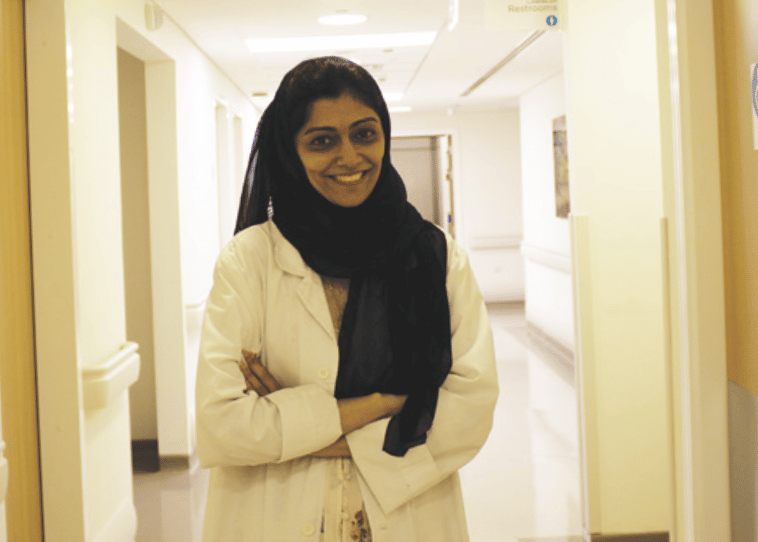
There’s laughter in the breast cancer ward.
Shaheenah Dawood is in her bright sunny office wearing a lab coat, a floral dress and a smile that can make anyone feel welcome and well.
The only thing that is infectious here, in these corridors at the Mediclinic Parkview Hospital in Dubai where we meet, is her energy.
Working 7AM to 10PM seeing cancer patients and giving them care and cure, this Consultant Medical Oncologist and Professor of Clinical Oncology can’t afford to not be that ray of light and hope, and to the care-giving staff around her as well – such as during the lockdown in 2020, when she ordered cheerful pink, blue and yellow scrubs and PPE for those in her department.
But the Emirati doctor’s 24-page CV and the assortment of papers, accolades and awards to her name apart, there is passion in her voice, and serious purpose to her work.
“I always knew oncology is what I wanted to do,” begins Dawood. “And for several reasons. One, I’m a chatterbox, and I could talk as much as I wanted to these patients; the people you’re going to form long-term relationships with. Two, if you get a patient with cancer early on, you can cure them, and the satisfaction you get from curing that one patient, there’s nothing like it… The last decade has been truly exciting in the field of oncology more than any other specialty.”
Typifying everything the United Arab Emirates (UAE) aims to be in the realm of healthcare for the world, with the glistening city of Dubai becoming the hotbed of healthcare innovation and medical tourism in recent years, Dawood is at the forefront of leading that change, with research, clinical trials, personalized medicine and breakthroughs in oncology to vastly change patient outcomes.
She trained in medical oncology at McGill University Hospitals in Canada, sub-specialized in breast cancer management at the MD Anderson Cancer Center, served as an Editorial Fellow at the New England Journal of Medicine and has an MPH degree from the Harvard School of Public Health.
She could have stayed on in the United States but decided to return home more than a decade ago to become one of the first female oncologists at the time in the UAE, and make a difference.
“I think the UAE, with our leader, is just unbelievable in the way it has put women out there in the healthcare sector. I came in with so many ideas that the first thing I did was put those ideas aside, and say ‘I need to develop something here that’s accommodating to the people here’. I became the head of oncology at Dubai Health Authority, but there was a lot of work to do.
“I developed multidisciplinary tumor boards and comprehensive cancer care programs, working with an excellent group of people. And then I decided to break off and do something other than just clinical work, so I started the Excellence in Oncology Care Summit, which started off with 120 people, and last year, we had 4,000 attending virtually as well as in-person from across Southeast Asia, the Middle East and Africa.”
The list goes on, and Dawood is now heading and establishing the oncology clinical trials program at Mediclinic City Hospital that will allow patients in the Middle East to access drugs they would otherwise not have been able to.
“Tests are horribly expensive, everywhere around the globe… There is data that compared to any other specialty, oncology medications cost the most… We need to have better access to treatment, and one of them is trying to overcome the cost… And we need to start addressing it seriously to be able to offer the same type of care to everyone, irrespective of their financial situation…
“I had a patient from Africa, I can tell you he sold his land to come here and get the medication. I have a lot of patients from Nigeria and Eritrea. We do hear their stories..,” says Dawood, her voice laced with concern but also hope.
In addition, she spends her time teaching at the Mohammed Bin Rashid University Of Medicine and Health Sciences and working with PhD and medical students on their research initiatives.
“The only thing that I keep telling the newer generation,” says the 40-something game-changer in the medical sector, “is that you can achieve what you set your mind to achieve by working hard, and that no problem is without a solution.”
Heartening words indeed in the world of cancer care.

